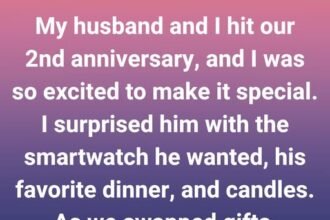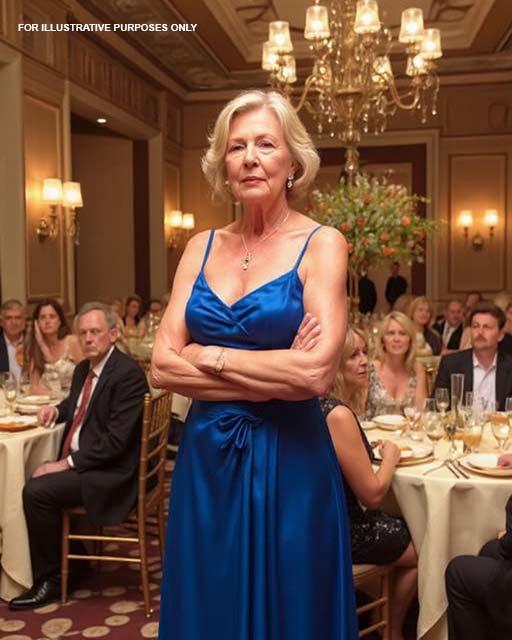The piece called me “a brilliant protégé.”
The word protégé told readers I was careful and in need of guidance — not the woman who had built everything with my own hands. People didn’t confront her. Not because they didn’t know the truth, but because Gwendolyn had the kind of social power that bought silence.
People wanted windows into her world. They wanted to bask in her reflected glow. Meanwhile, the restaurant’s ledger told another story: profits dwindling because entire tables were comped on her orders; inventory vanishing into her parties; reputation shifting toward clientele that wanted to be seen more than to eat.
It’s an odd betrayal: she made us desirable, and then she drained us of the very thing desire needs — an audience willing to pay. For three years, I watched it happen. I watched waiters who had been with me since my first batch of burnt baguettes step over their own discomfort to bow to her wishes.
I watched my husband try to broker peace and then subtly suggest I soften my voice when speaking about his mother. “She doesn’t mean harm, Izzy,” he’d say. He stood on the threshold between us; his loyalties tugged in two directions.
I let that confusion create silence in our home. Silence is its own form of violence. It nourishes people like Gwendolyn.
The night of the final dinner party — the one she called “a little celebration for the season” and invited her most gilded friends to — I should have known it would end everything. The air in the restaurant that night felt like static. Everyone moved with nervous precision, sensing a storm.
I had designed the evening as I designed most nights lately: careful choreography. There was a tasting menu I’d worked on for months, threading my grandmother’s comfort-food instincts with fine-dining techniques. Each course was a sentence in a long, patient story about how I cooked.
In the days leading up to it, I rehearsed patience. I let Gwendolyn send her guest list: Beatrice, who wore fur like an announcement; Seraphina, whose smile was a public utility; Helena, who brought husbands that clinked their glasses like they were testing their worth. Gwendolyn sent me a message: “Make sure the roast is generous.
The champagne is from my cellar.”
My staff rolled their eyes and asked if her cellar would be billed to the restaurant. Gwendolyn waved off any mention of bills like they were mosquitoes. I could have gone to Owen and insisted he take a stand.
But confrontation with Gwendolyn is like trying to argue with a storm; you get soaked, and she keeps rolling. So I crafted a subtler plan. Three months earlier, I had befriended June Park, a food blogger with a nose for stories.
She’d once cried into my broth because it reminded her of home. June began to write about us quietly, with affection. Her words brought people who paid for what they loved.
When I told her about Gwendolyn, she didn’t blink. “This is a story,” she said. “If you want them to see the truth, let them see it.”
So I invited two more guests to the party: Marco Alvarez, a critic whose reviews could make or break a restaurant, and Saffron Hayes, a journalist who loved honesty more than flattery.
They agreed to come as “friends of the restaurateur.”
Meanwhile, I’d been keeping my own kind of record — a parallel ledger showing the cost of Gwendolyn’s “generosity.”
Invoices, missing inventory, unbilled wine, and her signed notes. It wasn’t revenge I wanted — it was reality. That night, the restaurant glowed.
We’d set a long, communal table where people could overhear one another naturally. The tasting arrived in thoughtful waves: a citrus oyster to cut through the perfume of the guests; a smoked carrot velouté that made someone at the far end of the table weep; a slow-roasted duck that glowed like dusk. Every plate landed with the quiet weight of a promise delivered.
Gwendolyn arrived late, wrapped in mink, smiling like she owned the air. She introduced her guests and announced, “Isabel has outdone herself,” patting my husband’s arm as if the praise were hers to give. I waited.
The main course had just been cleared when June — playing the part of a curious guest — tapped her water glass. “I’ve written about many restaurants,” she said, smiling, “but I’ve never seen one that tells its story so honestly.”
Marco spoke first, describing the menu as “a conversation between courage and craft.”
Saffron added, “There’s something rare about a woman building something from the ground up — and rarer still when someone tries to take credit for it.”
The guests chuckled awkwardly. Gwendolyn’s smile froze.
Then June nodded to me. I turned to the projector we’d set up for the “menu visuals” — and instead of food photos, the screen filled with spreadsheets. Ledger entries.
Notes in Gwendolyn’s handwriting. Wine orders labeled “comp — personal friends.”
Emails asking staff to waive bills “for PR.”
There was a silence sharp enough to cut with a paring knife. I spoke quietly.
“This is my restaurant,” I said. “These are the numbers behind our meals. I’ve loved every guest who’s come through our doors.
But love isn’t supposed to bankrupt you.”
Owen stared at the screen. His face was pale, unreadable. Gwendolyn finally stood, her voice trembling between outrage and disbelief.
“How dare you— after everything I’ve done for this place—”
I looked at her evenly. “Yes. After everything you’ve done.”
The crowd didn’t clap.
They didn’t need to. Silence did the work. June’s camera was already rolling.
By the next morning, the video had gone viral — not in a h.u.m.i.l.i.a.t.1.n.g way, but in a revelatory one. The captions were kind: Chef takes back her restaurant from the socialite’s shadow. The press reframed it as a story of labor versus legacy, art versus entitlement.
Owen didn’t speak to his mother for weeks. When he did, it was short, quiet, and final. It took a year to recover.
Some nights the dining room was empty; some nights it was fuller than ever. But the people who came then came for the food, for the feeling, for the story that didn’t need embellishment. Caraway became, again, what it was meant to be — a place where food happened, yes, but also where truth simmered in the air.
Sometimes, when I close up late at night and the last light hums above the counter, I think about Gwendolyn. I think about how she wanted to be part of something she didn’t understand — that creation is love, not possession. Maybe one day she’ll come back and ask for a table.
Maybe I’ll seat her by the window, pour her a glass of wine, and tell her the menu hasn’t changed much. Just the ownership of the story.





